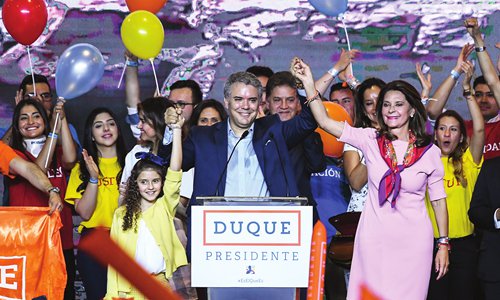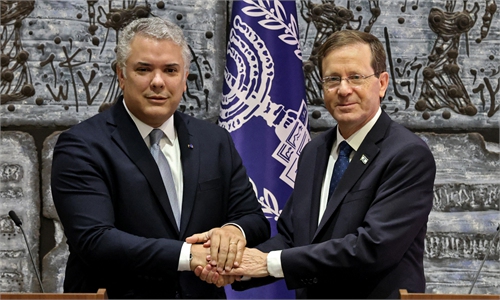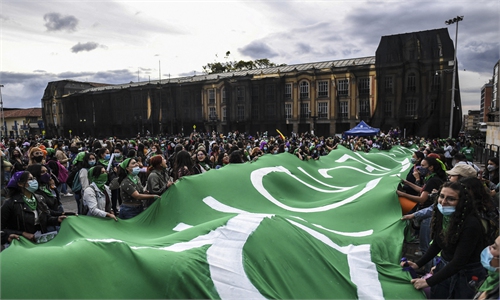Colombians vote to shortlist presidential contenders
Polls show left-leaning Gustavo Petro could win

Colombian presidential candidate Ivan Duque (center), of the Democratic Center party celebrates with supporters next to his running mate Marta Lucia Ramirez (right) and one of his daughters (left), after winning the first round of the Colombian presidential election, in Bogota on Sunday. The conservative candidate won the first round of Colombia's presidential election Sunday but fell short of the 50 percent threshold needed to avoid a runoff next month. The 41-year-old senator will face former guerrilla leader Gustavo Petro on June 17, the first leftist candidate to contest a runoff election in Columbia. Photo: AFP
As Colombians are expected to vote Sunday to draw up a shortlist of candidates for presidential elections, polls suggest they may yield the country's first-ever leftist leader.
Nearly 39 million of Colombia's 50 million inhabitants are eligible to cast their ballot in a complex but critical election in a country plagued by violence and growing poverty levels.
On one part of the ballot, voters will determine the composition of the Senate and House of Representatives, currently in the hands of right-wing parties.
But all eyes will really be on the outcome of the presidential primaries - called inter-party "consultations" - happening alongside the legislative vote.
In a country with a history of political violence and voter turnout traditionally below 50 percent, outgoing Colombian President Ivan Duque has promised safety "guarantees" for the non-compulsory vote.
It comes with the president and legislature both at rock-bottom levels of public opinion. Colombia has always been ruled by the political right, but polls show that former guerrilla, ex-Bogota mayor and senator Gustavo Petro, 61, on the left of the political spectrum, stands a real chance of winning.
Also in the running is former FARC hostage Ingrid Betancourt, who said in January she would vie to represent centrist parties as an alternative to both the ruling right and Petro.
Sunday's process must yield three presidential contenders from 15 candidates vying to represent groups of politically aligned parties - one each for the left, right and center.
Three others have already been chosen by their respective groupings.
Six finalists will face off in a first round of presidential elections on May 29, which will be followed by a runoff on June 19 if no one wins an outright majority.
Petro enjoys polled support of about 45 percent - more than any other candidate in a country traditionally distrustful of the left.
That distrust is widely associated with the now defunct Revolutionary Armed Forces of Colombia and other rebel groups that fought the government in a near six-decade civil conflict.
"When the government is unpopular, there is alternation and the opposition wins, but in Colombia, this is new: The left has never really been in a position to win an election," said analyst Yann Basset of the Rosario University in Bogota.
AFP



